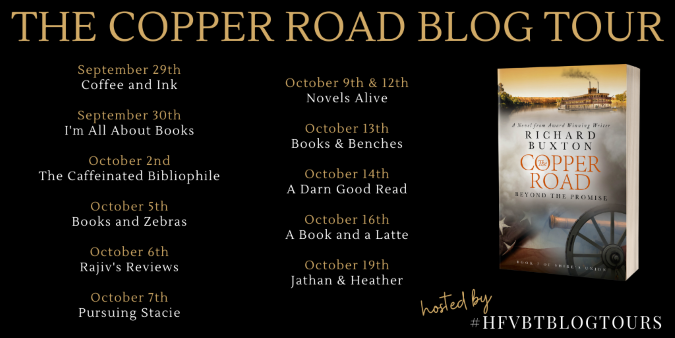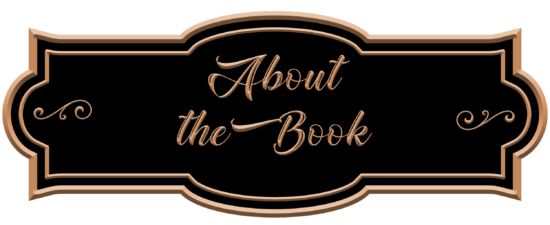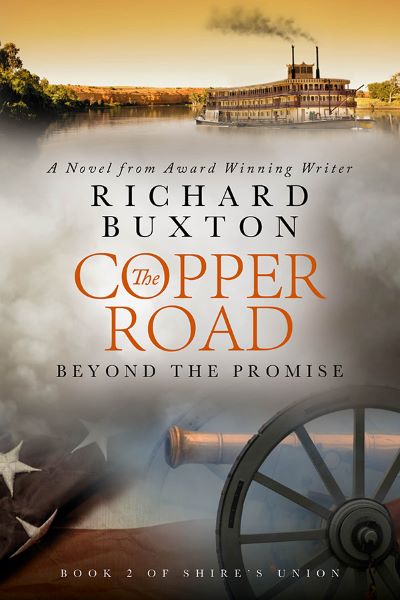 Please join me in welcoming Award-winning author Richard Buxton today, and thanks so much for joining us!
Please join me in welcoming Award-winning author Richard Buxton today, and thanks so much for joining us!
In your book, The Copper Road—Beyond the Promise, the second book in your Shire’s Union series, the Civil War is in its third bloody year, and the Union is moving steadily south. Having read this book, you must have done a great deal of research on the Civil War to have depicted the battles in such great detail. Can you tell us more about what sort of research you did for this series?
Firstly, thanks to Novels Alive for hosting this Interview. It’s really great to have a set of questions from someone who’s obviously really got deeply immersed in the book.
The short answer to you first question is, a great deal of research. A lot of the base historical material comes directly from the writing of the soldiers of the 125th Ohio Infantry. While the story meanders in and out of army settings, the backbone of the series is the 125th. I chose that regiment not only because it played some key roles in several big battles, but also because there is a wealth of first-hand written experience. Colonel Opdyke’s frequent and opinionated letters home to his wife, Lucy, are often written fresh after the events. Captain Ralsa Rice wrote engagingly about his experiences in Yankee Tigers and there are other collections of letters written by men from the regiment. One or two sentences in these letters can often inspire a whole scene. Added to this is some solid historical reading, usually two or three accounts of a specific battle.
However, all that can only get you so far. By far my favorite way of researching and gaining inspiration is to travel to where the action happened. In my case that means getting on a plane across the Atlantic and spending a couple of weeks visiting the places I know will matter to the story. I have done this many times. I book onto walks and talks led by park rangers, ride old rail routes, walk battlefields alone after sunset, tour ante-bellum properties, go down deep into mines. I even joined a re-enactor unit, learned the drill and went to camp and fought in West Virginia at the wonderfully named Droop Mountain. Anything to get closer to the mindset and experience of my characters.
I should stop now. I love to research. I could go on all day.
I find it fascinating that as a Brit, you would find a decidedly American war fascinating. What is it about our Civil War that you find so compelling?
I was a student in upstate New York at the age of nineteen for a semester and returned on a scholarship to Syracuse University aged twenty-one for a Masters in International Relations. So at a very impressionable age America made a big impact on me. The scale, the wealth, the people, their energy. When later I started to learn about the Civil War—actually it was Dee Brown’s Bury My Heart at Wounded Knee and the Indian wars that got me into the period—I could see all those things clearly there in the history. Civil War armies marched vast distances or rode on overcrowded steam trains or paddle-steamers. The naked ambition on the generals on both sides. The sheer magnitude of that war was enormous.
When I started to write short stories, I found I was setting them between the Civil War and the present and exploring the long shadow of the war. Some stories were set immediately after the war, others a few decades and some were present day. I’m fascinated by how the war informs America’s history and how it still resonates today. I liken it to getting to know someone new and becoming friends. Then maybe after a year or two you come to know some great trauma in that person’s past and only then understand them on a deeper level. The Civil War is America’s greatest trauma. I don’t believe you can understand America without knowing about that war.
At the beginning of the book, Tod has escaped, and after an Amish family aide in his escape further south, he is faced with a crisis of conscience that plagues him throughout the book. This is a great plot twist! I’ve got to know how you came up with that one?
Tod Carter is a real historical character. He really did escape a prison train and found his way back to his regiment. Some details of that journey were only very recently discovered and my version of that journey is fictitious, although I guessed correctly that his route involved Pittsburgh, Cincinnati and Memphis. What isn’t known are his thoughts and feelings on his long odyssey home and as a fiction writer that’s an area I get to explore.
Tod was a patriot to the Confederacy, but I wanted to challenge that. Everybody has doubts, right? I was also interested by the fact that Amish communities in some Union areas were allowed to avoid the war altogether on religious grounds. So I wanted to pit their views against the harsh realities of his. From Tod’s point of view his home had been invaded, but now he was years into a war that the Confederacy was starting to lose. I wanted that Amish voice in his head asking him constantly if he was doing the right thing.
In this second book in the series, you bring in a new character, an abolitionist and religious zealot, Lieutenant Wick—truly despicable, albeit compelling character. I found him to be a walking contradiction, which I’m sure was purposeful. Can you tell us why you brought in Lieutenant Wick?
A couple of reasons. Firstly, I needed some tension and conflict within the 125th and the Union Army. Otherwise, that aspect of the story could run a little flat, everyone being just too nice to each other. Also, while the Union Army clearly had the moral high ground in a war against slavery, it doesn’t mean everyone in that army was a good man or, as in Wick’s case, entirely sane.
His character was inspired, in part, by John Brown, the famous preacher who’s raid in Virginia was one of the final sparks that started the war. He’s generally remembered as a fervent abolitionist and a martyr, but there are some very dark sides to his story in Kansas and Missouri. He believed the killing innocents was justified in fighting slavery and took a very active hand in that. Today we’d call him a zealot. Wick asks the same question of Shire as the Amish ask of Tod, just in a very different way. When is it justified to kill?
There are so many conflicts of character or “gray areas” in the book that ask the reader, “What would you do in the same circumstances?” War brings out the worst in people, but it also shows the real character of an individual, and you depict that so well in this book. Did you want the reader to make a judgment call, or did you want the reader to think about what they would have done in similar circumstances?
This is such a great question and I’m so thrilled you got that from the book! I think it builds on the last answer. First and foremost, I wanted to place myself right there through my characters, and explore these dilemmas with them. How do their decisions and actions change them? If I write well enough, then it places the readers in that time and place as well and asks them the same questions. So I think it’s nearer to your latter point. What would you do? How would you behave? For all the research, imagining and re-enacting, we can only get part way there. Historical fiction nudges you closer. Personally, I suspect I’d have run screaming from the field when the first cannon sounded.
Without giving any spoilers away, you have created some conflict between the three characters that is rather—explosive. Do you find yourself rooting for one character over another, and if so, why?
I’m always going to root for Shire. Although I write from several characters point of view, he is the lead. And hey, he’s English too. Shire isn’t me, but there’s a fair bit of me in him. There are also strong connections to my father who worked with shire horses as a boy in Bedfordshire as Shire did. But I do get to root for all of them. When they come together in the book that’s often the most interesting time as a writer, finding out what they will say to each other and how their conflicts will resolve (or not). It’s never quite as you’ve imagined it.
I love your depiction of Clara, of her strength and fortitude. Do you have a woman(women) in your life who you have based Clara off?
No. That’s the true answer and the safest answer. Clara is the one being ‘saved’ in the first two books but that annoys her no end. I worked hard not to create some stereotypical victim. I have three daughters and they would never forgive me. Clara doesn’t see herself that way and she’s determined to cut her own path despite all she’s been through. I love her relationship to Shire. She’s often more like a bossy big sister. He’s slowly chipping away at that.
Can you tell us more about The Copper Road—Beyond the Promise. Something the synopsis doesn’t tell the readers.
That’s a powerful question. There’s very little room to express everything in the blurb that comes with a book. Let me answer it this way. My particular joy in writing is finding a compelling narrative that weaves its way amongst real historical events. Hence the mix of fictional and real characters. Also, fictional and real places. Comrie, Clara’s home, is fictional, but the Copper Road itself is not. I’ve walked some of what’s left of it in Polk County, Tennessee. It does indeed run beside the Ocoee River and allowed supplies to be taken up to Ducktown and copper ore back down to the railhead. Ducktown and its copper mines were real—however unlikely the name sounds. There’s a small museum just of I-68 if you are passing that way. What attracted me to this part of the world were the Appalachian folk tales of murder and moonshine. It was a dark place. Darker still during the Civil War and therefore a great unruly place to site many of the events in the book.
Tigers in Blue is the next book in the series. Can you tell us a little bit about that book?
Sure. Given the 125th Ohio are the historical backbone of the book, then those who know the history of the 125th will know where we are going geographically. But that’s likely to be a very small percentage of people. The history is that late in 1864 the war sweeps back into middle Tennessee as General Hood risks all to try and capture back Nashville and the state. The 125th are at the heart of the battle where all hangs in the balance.
For the principle characters it’s about two things. It’s about how the war has changed them and it’s about home. Another lesser known effect of the war was displacement, especially in the most war-torn states of which Tennessee is second only to Virginia. Not just the soldiers but half the population was uprooted and things wouldn’t settle out for many years to come. Home is also more than just about geography. It’s about people. Each character has their own story as it relates to home. Where it was, where it is and where they want it to be.
Do you have plans for a new series after the Shire’s Union series?
No firm plans but some ideas. Having done some re-enacting, I like the idea of basing a series on a bunch of re-enactors, all with their own modern-day problems but with the escape of dressing up and pretending on their weekends. Maybe even a time-slip element. These would be more humorous and shorter novels. But it’s all gotten so political in recent years that I’m not sure.
I’d also like to explore the ‘Specials’. These were the equivalent of latter-day war photographers but they worked in charcoal sketches. Amazing men who were in the thick of many battles.
But I will decide when Shire’s Union is complete.
Thanks again for such great questions. I’ve had a wonderful time answering them.
It was such a pleasure to have you today! I will have my review of your book coming on the 12th. And, *Spoiler Alert* I loved The Copper Road—Beyond the Promise, so stay tuned for that review!

Shire’s Union: Book 2
Release Date: July 26, 2020
 Shire is far from home, his old life in Victorian England a fading memory. He’s battled through war-torn America to keep a cherished promise to his childhood companion. Now she’s pushing him away, while the war won’t let him go. Fighting for the Union, Shire must survive the brutal campaign for Atlanta and try to imagine a future without her.
Shire is far from home, his old life in Victorian England a fading memory. He’s battled through war-torn America to keep a cherished promise to his childhood companion. Now she’s pushing him away, while the war won’t let him go. Fighting for the Union, Shire must survive the brutal campaign for Atlanta and try to imagine a future without her.
Clara is free from her husband but not from his ghost. After a violent end to an abusive marriage, she struggles to keep her home in the Tennessee hills as the war steals away its treasures and its people.
Tod, a captured Rebel, escapes in Pennsylvania. His encounters on the long road back to his regiment cast the Civil War in a different light. He begins to question his will to fight.
Three young lives become wrapped in the Rebels’ desperate need for copper. Friendships, loyalty and love will be tested beyond breaking point. Shire has new promises to keep.
The Copper Road is the second novel from award winning writer Richard Buxton. Book one of Shire’s Union, Whirligig, was shortlisted for the Rubery International Book Award.


During the Blog Tour, we are giving away 2 copies of The Copper Road by Richard Buxton! To enter, please use the Gleam form below.
The giveaway is open to US residents only and ends on October 19th. You must be 18 or older to enter.
The Copper Road

Richard lives with his family in the South Downs, Sussex, England. He completed an MA in Creative Writing at Chichester University in 2014. He has an abiding relationship with America, having studied at Syracuse University, New York State, in the late eighties. His short stories have won the Exeter Story Prize, the Bedford International Writing Competition and the Nivalis Short Story Award.
Richard’s first novel, Whirligig, was published in 2017 and shortlisted for the Rubery International Book Award.
Tuesday, September 29
Review at Coffee and Ink
Wednesday, September 30
Feature at I’m All About Books
Friday, October 2
Excerpt at The Caffeinated Bibliophile
Monday, October 5
Review at Books and Zebras
Tuesday, October 6
Review at Rajiv’s Reviews
Wednesday, October 7
Review at Pursuing Stacie
Friday, October 9
Interview at Novels Alive
Monday, October 12
Review at Novels Alive
Tuesday, October 13
Interview at Books & Benches
Wednesday, October 14
Review at A Darn Good Read
Friday, October 16
Review at A Book and a Latte
Monday, October 19
Interview at Jathan & Heather
















That was a fabulous interview! Thank you so much for hosting Richard & his blog tour today!
Amy
HF Virtual Book Tours
Thanks so much! Richard has written a brilliant and meticulously researched novel and I had to make sure my questions reflected those facts. I’m delighted to have Richard on Novels Alive today. =)